
THE PRINCIPLES OF DESIGN ARE RULES that designers use in combination to create a visual that is effective and aesthetically pleasing. Typically used in the art and design world, these principles and their relationship with each other work together to create a sense of harmony and cohesiveness.
As a designer, I practice and apply these principles when styling plants in the home. I've found so much joy in being inspired by nature and injecting elements of the earth and bringing them right into my living spaces. These principles have become an everyday part of life and have developed and shaped my personal style and taste as I continue to transform every nook into a relaxing green retreat.
Use one, several or as many principles as you see fit, keeping the rules in mind when shopping for plants or as you are styling the home. Below are my top design principles for styling your green spaces.
1. Think about hierarchy.
Also known as emphasis or focal point, hierarchy implies importance in a visual arrangement. When combining plants in a group, rank each by its characteristic feature in descending order, with your focal point having the highest ranking. Hierarchy can be reinforced through contrast in proximity, size, color, texture and shape.
2. Choose plants and pots with various textures.
Denne historien er fra February/March 2023-utgaven av Birds & Blooms.
Start din 7-dagers gratis prøveperiode på Magzter GOLD for å få tilgang til tusenvis av utvalgte premiumhistorier og 9000+ magasiner og aviser.
Allerede abonnent ? Logg på
Denne historien er fra February/March 2023-utgaven av Birds & Blooms.
Start din 7-dagers gratis prøveperiode på Magzter GOLD for å få tilgang til tusenvis av utvalgte premiumhistorier og 9000+ magasiner og aviser.
Allerede abonnent? Logg på
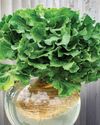
Basics of Hydroponics
Use these top tips and plant picks to have a successful soil-free garden
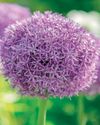
Rooted in Resilience
These hardy perennials will thrive in most zones
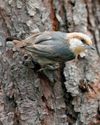
Social and Supportive
Brown-headed nuthatches take a helpful approach to raising their young

All About Owl Pellets
And why you should give a hoot about them
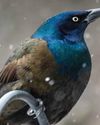
Ask the Experts
Advice from our pros about houseplants, bird feeding and more

BRING THE OUTDOORS IN
Making a terrarium is about as close as you can get to a Zen DIY project. Once you have gathered the proper materials and squared away your plant selections, it's as simple as layering it all together and watching your mini ecosystem thrive. Here, I'll walk you through my foolproof process and cover all the required elements for good filtration, healthy soil, strong root growth and resistance against fungus and disease.

GROW THIS. NOT THAT
Six easy-to-grow houseplants—and six that may not be the right choice for you

Winter MAGIC
Forecasts may be frigid, but grab your binoculars because birding opportunities are still incredible
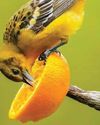
Sense or Nonsense? - Why some birds can taste and smell - but others can't
Does a porcelain berry taste like a blueberry to a gray catbird? Does a block of lard smell like frying bacon to a northern flicker? The short answer is no. While some avian species do have a well-adapted sense of taste or smell, they can't distinguish between flavors and odors the way humans can. They're not picking up every ingredient in the suet you put out, says José Ramírez-Garofalo, an ornithology researcher at Rutgers University in New Jersey and the director of Freshkills Biological Station in Staten Island, New York.

Maple Mania - Amazing facts about this fall foliage mainstay
Amazing facts about this fall foliage mainstay